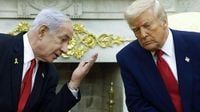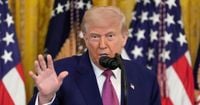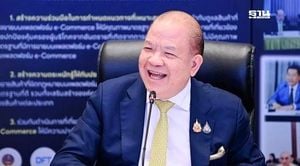US President Donald Trump has rejected an Israeli plan to assassinate Iran’s Supreme Leader Ayatollah Ali Khamenei amid escalating tensions and ongoing missile strikes between Israel and Iran. According to multiple senior US officials speaking to CBS News and Reuters, Trump conveyed to Israeli Prime Minister Benjamin Netanyahu that targeting Khamenei was "not a good idea" and vetoed the covert operation.
The conversation reportedly took place after Israel launched a series of attacks on Iranian nuclear infrastructure and other targets starting Friday, June 13, 2025. These strikes marked the beginning of a fierce exchange of missile attacks between the two nations, continuing into the third day by Sunday, June 15, 2025.
One senior US official explained Trump’s stance bluntly: "Have the Iranians killed an American yet? No. Until they do, we’re not even talking about going after the political leadership." This position aligns with the White House’s broader strategy to keep Israel’s military efforts focused on limiting Iran’s nuclear capabilities rather than provoking a wider regional war.
In a recent interview on Fox News, Netanyahu neither confirmed nor denied the reports about Trump vetoing the assassination plan, stating, "There are so many false reports of conversations that never happened, and I’m not going to get into that." However, he emphasized, "We do what we need to do. And I think the United States knows what is good for the United States." Netanyahu also highlighted the close coordination between Israel and the US, noting that they keep each other informed and that decisions are made with mutual respect for each country’s priorities.
An Israeli official told CBS News that "in principle," Israel does not target political leaders but concentrates on nuclear and military infrastructure. The official added pointedly, "I don’t think anyone making decisions about those programs should be living free and easy," referencing the Supreme Leader’s central role in Iran’s nuclear ambitions.
Since the initial Israeli strikes on June 13, which reportedly hit 250 sites including nuclear facilities, military locations, and populated areas, the conflict has intensified. Iran’s health ministry reported at least 224 deaths and around 900 injuries from Israeli attacks. Meanwhile, Iran has responded with waves of drones and ballistic missiles aimed at Israeli cities, with the Israel Defense Forces intercepting most attacks. Explosions and loud booms were reported in Haifa, Tel Aviv, Jerusalem, and other areas. Ten people were killed in Israel following Iranian strikes, with casualties in Bat Yam and Tamra.
Trump has remained vocal on social media, posting on his Truth Social platform that "Iran and Israel should make a deal, and will make a deal. We will have PEACE, soon, between Israel and Iran! Many calls and meetings now taking place." He expressed confidence in his ability to broker peace, referencing his previous success at de-escalating tensions between India and Pakistan after their recent border clashes.
Despite the ongoing violence, Trump has emphasized that the US "had nothing to do with the attack on Iran," distancing Washington from the initial Israeli offensive. Still, he issued a stern warning to Iran, saying, "If we are attacked in any way, shape or form by Iran, the full strength and might of the U.S. Armed Forces will come down on you at levels never seen before." This statement underscores the US commitment to supporting Israel while attempting to deter further escalation.
The diplomatic front has also been affected. Scheduled nuclear talks between the US and Iran, set to take place on Sunday, June 15, 2025, in Oman, were canceled amid the hostilities. Iran reportedly told mediators from Qatar and Oman that it would not entertain ceasefire negotiations while under Israeli attack.
Trump has engaged in discussions with Russian President Vladimir Putin about the crisis, indicating a potential role for Russia in mediating the conflict. He is also attending the G7 summit in Calgary, Canada, where the Middle East conflict is expected to dominate discussions among world leaders.
Prime Minister Netanyahu stressed that even if Iran agrees to halt missile attacks as part of any peace deal, it would not necessarily stop developing its nuclear program. "The issue here is not de-escalation. The issue here is not ceasefire. The issue is to stop those things that threaten our survival," he told Fox News.
As tensions remain high, Tehran has seen heavy traffic with many citizens trying to leave the city amid fears of further attacks. The situation remains volatile, with both Israel and Iran continuing to launch strikes and counterstrikes, while the international community watches closely, hoping for a diplomatic resolution before the conflict spirals further out of control.





